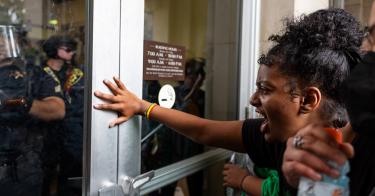Hot takes of the pro-Palestinian, anti-Israel demonstrations on our college campuses quickly became common. But those with enough legal and historical context to properly assess the situation have been rare.
Some observers and participants wishfully called the protests a “Student Spring.” Others saw them as practice for the Democratic National Convention. Still others noted the broader anti-capitalist, anti-America rhetoric at some protests, and they suggested activists are ambitiously preparing to smash America in a socialist revolution.
Some protests have been peaceful and rule-abiding or, as at the University of Chicago, close enough to be tolerated for a time. (The Chicago activists’ demands came to include a call for disbanding the campus police and “decarbonizing the endowment.”) In contrast, the encampment at the University of California, Los Angeles, became increasingly violent, and “professional agitators” appear to have aggravated tension on many campuses.
The environment for Jewish students at many colleges and universities has degenerated into hostility since the Oct. 7 Hamas terrorist attacks inspired protesters who caused Cooper Union students to be barricaded in a library for their safety. Students have been assaulted. Police action has been required.
Violence, property damage and land takeovers by protesters are plainly inconsistent with respect for the rights of others. Coercive tactics have no place in institutions dedicated to the powers of reason and persuasion. Mahatma Gandhi and the Rev. Martin Luther King Jr., champions of civil disobedience, acknowledged that nonviolent disobedience still requires appropriate discipline in a society that respects the rule of law. Today’s legacy is not theirs.
>>> Let’s Put Suspension or Expulsion Back on the Table for Violent College Students
And some universities’ reactions against the protests might have gone too far, especially regarding protected speech. The right of expression on matters of vital international concern is sacrosanct.
America’s tradition of free speech ought to be the envy of the world. But recent events again remind us that it can thrive only in the context of an ordered society.
The free-speech scholar Thomas Emerson envisioned our tradition as a “system of free expression,” by which he meant that speakers, listeners and authorities have reciprocal rights and duties that ensure the rights of everyone—including protection of what Supreme Court Justice Oliver Wendell Holmes called “the thought that we hate.”
This system cannot prevail without the lawful order that protects all speakers—protesters and their critics—against being canceled, shouted down, coerced or attacked.
Alexander Meiklejohn, the great free-speech philosopher and educator who was one of the first to speak up against McCarthyism, wrote similarly that “to be afraid of an idea, any idea, is to be unfit for self-government.” He later wrote: “Political freedom does not mean freedom from control. It means self-control.”
Meiklejohn’s elaboration on the classic concept of “ordered liberty” contrasts with the mob rule of too many of today’s protesters. Protest is itself bounded by constitutional limits protecting the rights of others. When power replaces persuasion, freedom and society deteriorate.
While campus authorities are finally hearing the call for ordered liberty, many of them contributed to its precariousness in recent decades. Universities’ well-documented double standards have restricted and punished open inquiry as well as rule-abiding campus dissent.
Colleges and their diversity, equity and inclusion staff have enacted speech codes, Orwellian anonymous complaint programs, “bias incident” protocols, runaway DEI indoctrination and enforcement, and toleration of heckler’s vetoes and speech cancellations ad nauseam that have smothered free inquiry from within.
>>> Confronting the Campus Revolutionary Wannabes
Many have also fostered an ideology pitting identity and other groups against one another. In so doing, they at least implicitly encouraged the misbegotten belief that duly constituted laws and rules should be differentially applied and should not stand in the way of favored political causes. This belief took root on campuses in the unrest of the 1960s, and it has spread in the decades since.
The Atlantic’s George Packer traces such betrayal to the famous five-building occupation of Columbia by students in 1968. A year later, one of us was at Cornell when students took over the student center with 20 rifles, then escaped punishment. It was no accident that Cornell’s leaders had previously elevated the promotion of social change to the top tier of its mission and vision, competing with the duty to educate and to teach students how to think.
An inevitable consequence of failing society in this manner is that society will push back.
Universities have squandered the institutional autonomy they used to deserve. State and federal legislators from the right, and internal activists from the left, who exploit campus leaders’ weaknesses—often greatly assisted by outside groups and funding—are, sometimes literally, shaking down the campus gates. Too many colleges have been losing control over their own destiny, from both without and within.
Higher education was in crisis long before Oct. 7. It will continue to be so until its leaders and students restore the dual commitment to the free inquiry and ordered liberty that makes freedom on campus—and for all of us—possible.
This piece originally appeared in The Washington Times



